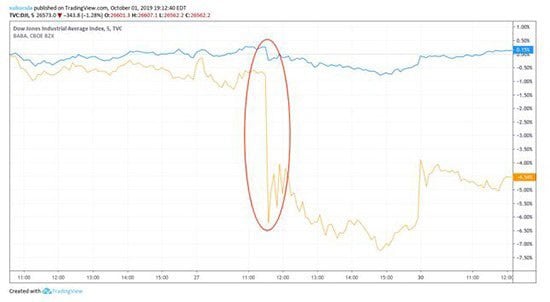Last Friday, a "flash crash" hit Chinese stocks trading on U.S. exchanges. China's $440 billion equivalent to Amazon.com Inc. (NASDAQ: AMZN), Alibaba Group Holding Ltd. (NYSE: BABA), dropped 7% in just four minutes.
Those stocks tried to recover early in the week but are now back at the levels hit last Friday.
On the surface, it looked like a small market "blip," or hiccup. But the truth is, this was nothing less than a ferocious salvo of fire in a war, just as surely as if it'd been two destroyers at sea blasting away at each other.
It's a different kind of war, though - economic war.
And every investor needs to come to terms with it and learn the simple way to protect your stocks and trading positions against it.[mmpazkzone name="in-story" network="9794" site="307044" id="137008" type="4"]
The Negotiating Ploy That Sank the Markets
This quick drop into despair and then modest recovery were caused by the same thing that has led to most of the quick market drops we've seen since early 2018: the trade dispute with China.
This time, a leak from the White House had traders running for the hills.
Free Book: The secrets in my book helped one Money Morning reader make a $185,253 profit in just eight days. Learn how to claim your copy here...
Except the leak, no doubt intentional, wasn't meant for the markets. Its intended target was 6,800 miles from Wall Street, in Beijing's Zhongnanhai complex - kind of like the White House and Capitol all rolled into one, with a little Pentagon for good measure.
As a trader, it's easy to get so focused on the short-term action of candlestick charts or news headlines that you lose sight of the bigger picture.
So, let's take a step back.
This leak, picked up by Bloomberg News last week, has already been walked back by the White House.
It's just another of the many give-and-take negotiating ploys that we'll see in the coming months. And we'll be able to use these market moves to make money.
Since it started in January 2018 the current tit-for-tat tariff dispute with China has been by far the biggest source of uncertainty in the market.
Every tweet, every announcement, even the smallest leak has sent the markets skyward with optimism or downward in despair.
Last Friday, it happened again when reports came out that the Trump administration was considering forcing Chinese companies to delist from U.S. stock exchanges and preventing U.S. government pension funds from investing in China.
As you can imagine, Chinese stocks trading here in America plunged when this news came out. For example, the orange line in this chart is Alibaba:

As you can see, BABA dropped like a stone just after 11 a.m. The broader market (represented by the Dow in blue) also dipped, albeit by an order of magnitude less.
America is the largest market of invested capital in the world - about five times larger than China's. So the consequences of losing access to these resources would be huge for Chinese companies. It would mean losing access to the American capital market, worth more than $30 trillion.
More than 200 Chinese companies are listed on American exchanges, and they have raised hundreds of billions of dollars (Alibaba alone raised $25 billion). Cutting off access to all that money would be catastrophic for those companies.
And that's without considering smaller Chinese companies looking to finance their growth through IPOs, which would have to list elsewhere at lower prices.
That's exactly why I have no doubt that this leak from the White House was intentional - and aimed not at traders, but at China's trade negotiators.
But the truth is that even this turmoil pales in comparison to the worst-case "what if" possibilities
China and America Possess Devastating Financial Weapons
Friday's "flash crash" in Chinese stocks was just a taste of what China would see if the White House cut off China's access to U.S. capital markets.
And that's exactly why these ideas were leaked. It's a warning shot to China to keep these negotiations going.
BIG, FAST PROFITS: My one pick paid 100% in seven days, then 205% the next day, and 410% by the next week. You've got to see how I do this...
But let's be clear: It's very unlikely that America would ever do anything like the leaks suggest. It's a last resort, a "nuclear option," if you will - something with consequences so devastating for the adversary that it would leave them with no option but to respond in kind.
It's a bit similar to the Cold War military doctrine known as "mutually assured destruction." This was the idea that the United States, the Soviet Union, and China would never use nuclear weapons against each other because the others would use theirs against the attacker. Everyone and everything would be destroyed - guaranteed - and no one would win.
So using nuclear weapons would not achieve victory, the thinking went. But having them made sure you had a seat at the table and respect from the other nuclear powers.
Something similar is going on here.
It Only Takes 10 Minutes a Week to Double Your Way to $1 Million: My strategy doesn't require any special training - yet it could potentially put $1 million in your bank account faster and easier than you ever dreamed...
For years now, there's been talk about China's "nuclear option" against America's economy: The more than $1.11 trillion of U.S. government debt owned by China.
That's more than a quarter of all Treasury bills, bonds, and notes.
If China were to sell these Treasuries on the open market, the consequences for the United States would be catastrophic. As bond prices plummeted toward zero, yields would skyrocket (because they move inversely to price).
And consumer interest rates are closely tied to Treasury yield, so interest rates would also skyrocket. A deep recession (or worse) wouldn't be far behind.
But the Chinese government won't do that unless it's desperate. Selling $1.11 trillion worth of Treasuries - more than a quarter of all of them - would flood the market, dropping the price and ensuring that China got far, far less than $1.11 trillion for them.
And of course, as is always the case, if China used its "nuclear option," America would use ours.
That's precisely why Trump's trade negotiators leaked these reports to the press in the first place. It's a reminder to the Chinese government that America has a "nuclear option" too.
It's a regular negotiating tactic, nothing more.
Here's What to Do Now
For traders, it shows that the markets continue to be extremely sensitive to anything relating to tariffs. The "trade can" may have been kicked down the road when China and the United States began negotiating behind closed doors, but the uncertainty surrounding trade continues to be the biggest storm cloud hanging over markets.
Expect more leaks - and more overreactions from the market. Keep your trades on a short leash, get in and get out quickly, and always set your goals and acceptable risks ahead of time. That's the guiding principle behind the 10-Minute Millionaire recommendations I'm making for my paid subscribers right now.
The market volatility will continue. Play it right, and you'll see superior profits.
America's Favorite Angel Investor Shows How Easy It Is for Anyone to Invest in Ground-Floor Startups
You've probably seen stories about this person or that person making an absolute fortune from some unknown startup suddenly becoming a household name... like Uber, Airbnb, SpaceX, or Bird.
Now, it's your turn.
Shark Tank's Robert Herjavec is showing how easy it is for anyone to turn as little as $50 into what can be life-changing windfalls... all from investing in startups.
Follow Money Morning on Facebook and Twitter.
About the Author
D.R. Barton, Jr., Technical Trading Specialist for Money Map Press, is a world-renowned authority on technical trading with 25 years of experience. He spent the first part of his career as a chemical engineer with DuPont. During this time, he researched and developed the trading secrets that led to his first successful research service. Thanks to the wealth he was able to create for himself and his followers, D.R. retired early to pursue his passion for investing and showing fellow investors how to build toward financial freedom.



